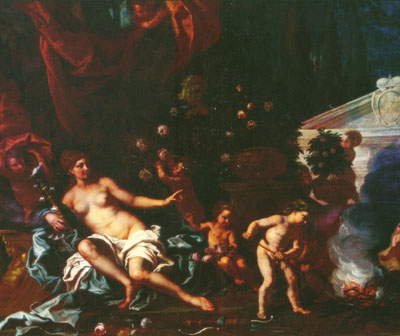
At Eggenberg Venus “is seen resting on an elevated garden terrace, protected by a sun awning and surrounded by dense rose hedges. In her right hand,” Kaiser continues, “she holds a shell and a scepter with climbing roses as a sign of her benevolent reign. The outstretched left hand gives instructions to cherubs who are busy complying with her orders. They tend the roses, arrange them in vases and tie them into garlands. Cupid, in the foreground, tends a fire in which the thorny branches are burned.” The requirements of pictorial representation have severely limited the Eggenberg painter to an anecdotal, one-dimensional view of this goddess of love and beauty, fecundity, civility and distemper. All is positive, cheerful and gentle, a simplification, if not a travesty, of Venus’ complexity.
APHRODITE is the longest and most densely interrelated series of books in the Sentence. Its nine titles have 72 relationships among them. Five are about places especially appropriate to their complex tutelary goddess; four are governed by “hypertexts,” that is, classic writers and their texts: Cervantes; Apollonius, Vergil and Muhammed; Dante, Tasso and Ariosto; Ovid and Lady Muraski. These texts and their authors have been chosen because they discourse profoundly on the nature and variety of love and reflect the diverse cultures and religions that depend upon and promulgate such visions. MM believes that Aphrodite ties back into the Magna Mater, Ishtar and Cybele, goddesses of fecundity, and is deeply involved in marriage and the civilizations that socially and politically depend upon the institution.